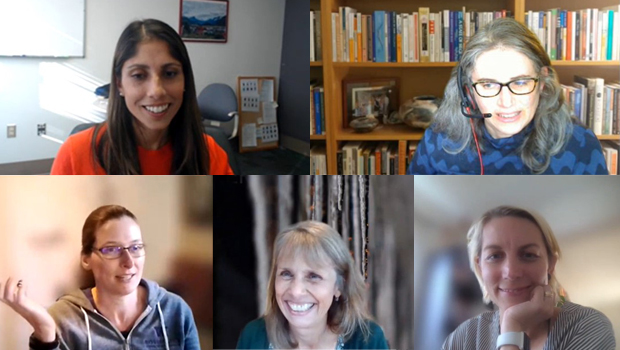Events
Upcoming events and seminars
May 7, 2024
How Lived Experience Shapes My Approach to Mental Health Care
12 to 12:55 p.m.
The views expressed in the seminars and events hosted by KPWHRI do not necessarily reflect those of Kaiser Permanente
Speaker: Helene Speyer, MD, PhD, is a psychiatrist and researcher in the Danish health care system, based in Copenhagen, Denmark. In addition to her clinical practice, she does research on the discontinuation, tapering, maintenance, effectiveness, and side effects of antipsychotic drugs; exercise interventions, weight management, lifestyle coaching and mental health; and metabolic and cardiac risk factors and schizophrenia.
Summary
In this seminar, Dr. Speyer will discuss the personal and theoretical underpinnings of her research on patient-centered mental health treatment, particularly the use of medications for depression, attention-deficit disorders, and psychotic illnesses. She explains how her own health care experiences and her clinical studies motivate her research and approach to working with clients.
Join the meeting
Meeting ID: 248 449 519 506
Passcode: 5kCsc3
Dial-in by phone
+1 213-533-9530,,774196478# United States, Los Angeles
Phone conference ID: 774 196 478#
Join on a video conferencing device
Tenant key: teams@evc.kp.org
Video ID: 111 064 294 4
Past events and Seminars
April 2, 2024
Recipes for Natural Language Processing: A Guide to Solving Problems using Clinical Text
12 to 12:55 p.m.
View the video presentation
The views expressed in the seminars and events hosted by KPWHRI do not necessarily reflect those of Kaiser Permanente
Speaker: David Cronkite (he/him), MS, has been a computational linguist at KPWHRI for over 10 years, supporting a number of projects by applying NLP in diverse environments including mental health, marijuana use, COVID-19, neuropathy, and anaphylaxis. He has particular interests in building scalable, portable, and reusable solutions in addition to exploring applications of machine learning in resource constrained environments.
Speaker: Will Bowers (he/him/his), MS, is a computational linguist here at KPWHRI. He leverages natural language processing (NLP), linguistics, and machine learning (ML) to extract information from medical records. Will contributes to various projects at KPWHRI, like Adult Changes in Thought (ACT), FDA’s Sentinel Initiative, and projects studying substance abuse. Will received his Master of Science in Computational Linguistics in 2021, and a Bachelor of Science in Informatics in 2020, both from the University of Washington. He enjoys working in research, and he is interested in pursuing a PhD in computational linguistics, biomedical informatics, or a related field.
Summary
Natural language processing (NLP) is a quickly evolving field that is transforming many aspects of human life. Here at KPWHRI, David Cronkite and Will Bowers are hard at work applying NLP to health research. In this presentation, they will provide an overview of how they leverage NLP to unlock a largely untapped resource – medical records. They will introduce us to what NLP is, how it is uniquely employed at KPWHRI, and provide ideas for future projects that leverage NLP).
February 6, 2024
Robustly estimating heterogeneity in factorial data using Rashomon Partitions
12 to 1 p.m.
View the video presentation
The views expressed in the seminars and events hosted by KPWHRI do not necessarily reflect those of Kaiser Permanente
Speaker: Tyler Harris McCormick (he/him/his) is a Professor of Statistics and Sociology at the University of Washington, where he is also a core faculty member in the Center for Statistics and the Social Sciences. He is also a Senior Data Science Fellow at the eScience Institute, UW's data science center. Tyler's work develops statistical models that infer dependence structure in scientific settings where data are sparsely observed or observed subject to error. His recent projects include estimating features of social networks (e.g. the degree of clustering or how central an individual is) using data from standard surveys, inferring a likely cause of death (when deaths happen outside of hospitals) using reports from surviving caretakers, and quantifying & communicating uncertainty in predictive models for global health policymakers. He holds a Ph.D. in Statistics (with distinction) from Columbia University and is the recipient of an NIH New Innovator (DP2) Award, NIH Career Development (K01) Award, Army Research Office Young Investigator Program Award, and a Google Faculty Research Award. Tyler is the former Editor of the Journal of Computational and Graphical Statistics (JCGS) and a Fellow of the American Statistical Association. More information is available on his website: thmccormick.github.io.
Summary
This presentation will propose an approach to enumerating heterogeneity in the relationship between an outcome and discrete covariates by creating a Rashomon Partitions Set (RPS). Each Rashomon partition consists of the feature combinations that maximize heterogeneity in the outcome space. We construct this by pooling similar feature combinations using priors over pooling patterns in an overarching Bayesian model. We show that we can characterize the set of Rashomon Partitions in terms of its fraction of the overall posterior and size. Further, we demonstrate that the RPS is enumerable in meaningful settings by leveraging the insight that many potential combinations of features are, in practice, nonsensical for pooling because they represent different dimensions in the covariate space. We demonstrate RPS construction in the context of two practical settings: finding heterogeneity in outcomes of a randomized trial and examining racial disparities in health outcomes in a large clinical dataset. This is joint work with Arun Chandrasekhar (Stanford Economics) and Aparajithan Venkateswaran (UW Statistics).



